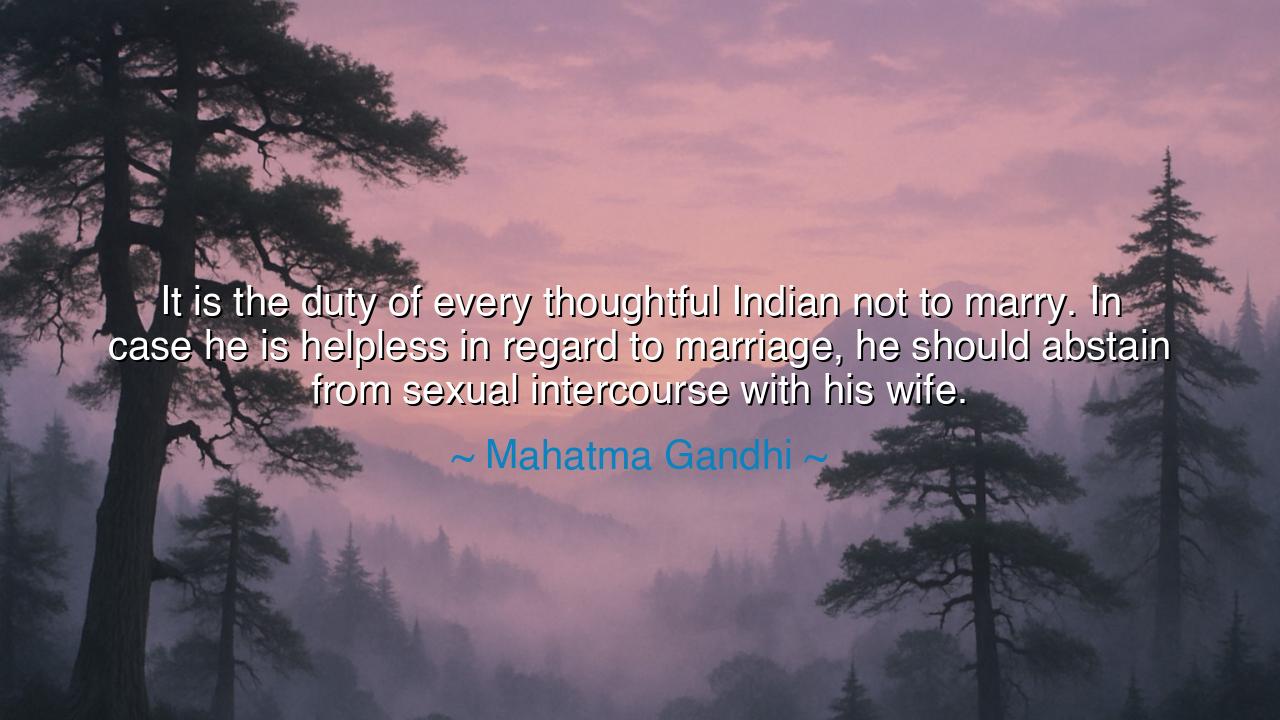
It is the duty of every thoughtful Indian not to marry. In case
It is the duty of every thoughtful Indian not to marry. In case he is helpless in regard to marriage, he should abstain from sexual intercourse with his wife.






The words of Mahatma Gandhi — “It is the duty of every thoughtful Indian not to marry. In case he is helpless in regard to marriage, he should abstain from sexual intercourse with his wife.” — echo with the austerity of a sage who sought liberation not only for his nation, but for the soul of mankind. To the modern ear, they may sound severe, even strange. Yet beneath their surface lies a truth both ancient and profound: that self-mastery is the foundation of freedom, and that desire, when left unchecked, binds the spirit more tightly than chains of iron. Gandhi, in his unyielding pursuit of purity, spoke not against love, but against attachment — not against marriage, but against enslavement to passion.
Mahatma Gandhi, the Father of India, lived not as a philosopher removed from the world, but as one deeply immersed in its suffering. He saw his people shackled not only by colonial rule, but also by ignorance, indulgence, and dependence upon worldly pleasures. To him, sexual desire represented one of the strongest of these chains — a force that drained men of discipline, clarity, and moral strength. His belief in brahmacharya — or celibacy — was born of his conviction that a life dedicated to truth and service must be unclouded by the impulses of the flesh. For Gandhi, chastity was not repression, but liberation — the redirection of human energy from the pursuit of pleasure toward the pursuit of divine purpose.
The origin of this quote lies in Gandhi’s writings and speeches on moral reform and national discipline during India’s struggle for independence. He saw that a nation’s freedom could not endure if its citizens remained slaves to desire. He called upon the youth to rise above instinct, to cultivate restraint and virtue. For those who could not forgo marriage, he urged a higher path — the practice of self-control within marriage, transforming it from a bond of desire into a partnership of spiritual growth. To Gandhi, the body was a servant of the soul, and marriage was not a license for indulgence, but a sacred trust demanding purity of intention.
In ancient times, similar wisdom flowed through the teachings of the great rishis of India. The sages of the Upanishads taught that energy misused becomes bondage, but energy mastered becomes enlightenment. Many of them lived as householders, yet practiced continence and moderation, channeling their power into meditation, compassion, and service. Gandhi, walking in their footsteps, brought this ancient spiritual discipline into the modern world, blending the ideals of renunciation with the demands of activism. His vision was not to populate the world, but to purify it, to awaken a people not through birth, but through rebirth of conscience.
Consider the example of Gandhi’s own life. Though married at a young age to Kasturba Gandhi, he later took a vow of celibacy, declaring that love between husband and wife must transcend desire and become an offering to God. His abstinence was not a denial of affection, but a deepening of it — for he believed that true love is not possession, but service. Their union became one of shared sacrifice, of mutual growth in the path of simplicity and truth. Through such personal renunciation, Gandhi sought to lead by example, showing that inner strength is the wellspring of all external victories.
Yet, Gandhi’s words are not commands for all people, but challenges to the thoughtful — to those who seek to understand the deeper nature of freedom. He does not condemn marriage, but calls for mindfulness within it. The heart of his teaching is this: that every act of indulgence has a cost, and every act of restraint has power. If one cannot rise above desire, then let desire itself become disciplined. Let love be tempered by purpose, and pleasure by compassion. Only then can one live not as a slave to the senses, but as a master of them — a being of clarity, balance, and peace.
The lesson for all who hear his words is eternal: freedom begins within. The one who conquers his passions is greater than the one who conquers kingdoms. Whether one marries or remains single, the higher law remains the same — to live with intention, to act with purity, to serve with detachment. Gandhi’s teaching is a reminder that the struggle for independence is not only political, but personal. Each person must free themselves from the tyranny of craving, so that love may be sacred, and life may be guided by conscience rather than compulsion.
So, my children, heed this wisdom of the Mahatma: seek not merely to satisfy, but to sanctify. If you love, let your love uplift. If you marry, let your union be one of spirit, not of appetite. For only when the heart is disciplined, when desire bows before duty, and when the self serves the soul, can humanity rise from bondage to true freedom — the freedom of peace, purity, and purpose that Gandhi lived, taught, and offered to the world.






AAdministratorAdministrator
Welcome, honored guests. Please leave a comment, we will respond soon